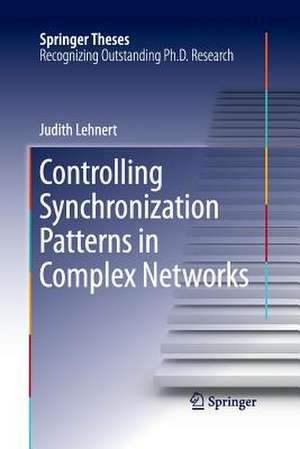Controlling Synchronization Patterns in Complex Networks: Springer Theses
Autor Judith Lehnerten Limba Engleză Paperback – 23 aug 2016
| Toate formatele și edițiile | Preț | Express |
|---|---|---|
| Paperback (1) | 636.63 lei 43-57 zile | |
| Springer International Publishing – 23 aug 2016 | 636.63 lei 43-57 zile | |
| Hardback (1) | 642.83 lei 43-57 zile | |
| Springer International Publishing – 17 noi 2015 | 642.83 lei 43-57 zile |
Din seria Springer Theses
- 18%
 Preț: 997.88 lei
Preț: 997.88 lei -
 Preț: 389.88 lei
Preț: 389.88 lei - 15%
 Preț: 646.94 lei
Preț: 646.94 lei - 18%
 Preț: 943.43 lei
Preț: 943.43 lei -
 Preț: 399.29 lei
Preț: 399.29 lei - 18%
 Preț: 944.99 lei
Preț: 944.99 lei - 15%
 Preț: 636.80 lei
Preț: 636.80 lei - 18%
 Preț: 941.05 lei
Preț: 941.05 lei - 15%
 Preț: 643.16 lei
Preț: 643.16 lei - 15%
 Preț: 642.68 lei
Preț: 642.68 lei - 18%
 Preț: 1103.62 lei
Preț: 1103.62 lei - 20%
 Preț: 558.82 lei
Preț: 558.82 lei - 18%
 Preț: 1112.30 lei
Preț: 1112.30 lei - 18%
 Preț: 944.19 lei
Preț: 944.19 lei - 18%
 Preț: 1109.92 lei
Preț: 1109.92 lei - 18%
 Preț: 1217.27 lei
Preț: 1217.27 lei - 15%
 Preț: 640.06 lei
Preț: 640.06 lei - 15%
 Preț: 636.45 lei
Preț: 636.45 lei - 15%
 Preț: 640.06 lei
Preț: 640.06 lei - 15%
 Preț: 640.88 lei
Preț: 640.88 lei -
 Preț: 389.70 lei
Preț: 389.70 lei - 20%
 Preț: 563.89 lei
Preț: 563.89 lei -
 Preț: 393.35 lei
Preț: 393.35 lei - 15%
 Preț: 637.93 lei
Preț: 637.93 lei - 15%
 Preț: 641.85 lei
Preț: 641.85 lei - 18%
 Preț: 1225.94 lei
Preț: 1225.94 lei - 20%
 Preț: 551.36 lei
Preț: 551.36 lei - 18%
 Preț: 1229.10 lei
Preț: 1229.10 lei - 15%
 Preț: 639.25 lei
Preț: 639.25 lei - 18%
 Preț: 999.45 lei
Preț: 999.45 lei - 15%
 Preț: 640.06 lei
Preț: 640.06 lei - 18%
 Preț: 1220.45 lei
Preț: 1220.45 lei - 18%
 Preț: 1116.26 lei
Preț: 1116.26 lei - 18%
 Preț: 1110.72 lei
Preț: 1110.72 lei - 18%
 Preț: 1000.87 lei
Preț: 1000.87 lei - 18%
 Preț: 891.17 lei
Preț: 891.17 lei - 15%
 Preț: 640.06 lei
Preț: 640.06 lei - 5%
 Preț: 1154.07 lei
Preț: 1154.07 lei - 15%
 Preț: 635.96 lei
Preț: 635.96 lei - 15%
 Preț: 640.88 lei
Preț: 640.88 lei -
 Preț: 387.20 lei
Preț: 387.20 lei - 18%
 Preț: 1109.92 lei
Preț: 1109.92 lei -
 Preț: 385.25 lei
Preț: 385.25 lei -
 Preț: 385.25 lei
Preț: 385.25 lei - 18%
 Preț: 1112.30 lei
Preț: 1112.30 lei - 18%
 Preț: 999.45 lei
Preț: 999.45 lei -
 Preț: 386.99 lei
Preț: 386.99 lei - 15%
 Preț: 637.13 lei
Preț: 637.13 lei - 20%
 Preț: 554.20 lei
Preț: 554.20 lei - 20%
 Preț: 555.57 lei
Preț: 555.57 lei
Preț: 636.63 lei
Preț vechi: 748.97 lei
-15% Nou
Puncte Express: 955
Preț estimativ în valută:
121.82€ • 127.53$ • 100.80£
121.82€ • 127.53$ • 100.80£
Carte tipărită la comandă
Livrare economică 07-21 aprilie
Preluare comenzi: 021 569.72.76
Specificații
ISBN-13: 9783319370903
ISBN-10: 3319370901
Pagini: 203
Ilustrații: XV, 203 p.
Dimensiuni: 155 x 235 mm
Greutate: 0.31 kg
Ediția:Softcover reprint of the original 1st ed. 2016
Editura: Springer International Publishing
Colecția Springer
Seria Springer Theses
Locul publicării:Cham, Switzerland
ISBN-10: 3319370901
Pagini: 203
Ilustrații: XV, 203 p.
Dimensiuni: 155 x 235 mm
Greutate: 0.31 kg
Ediția:Softcover reprint of the original 1st ed. 2016
Editura: Springer International Publishing
Colecția Springer
Seria Springer Theses
Locul publicării:Cham, Switzerland
Cuprins
Introduction.- Complex Dynamical Networks.- Synchronization In Complex Networks.- Control of Synchronization Transitions by Balancing Excitatory and Inhibitory Coupling.- Cluster and Group Synchrony: The Theory.- Zero-Lag and Cluster Synchrony: Towards Applications.- Adaptive Control.- Adaptive Time-Delayed Feedback Control.- Adaptive Control of Cluster States in Network Motifs.- Adaptive Topologies.- Conclusion.
Notă biografică
Judith Lehnert studied physics at Humboldt Universität zu Berlin, Technische Universität Berlin, Germany, and the University of Leeds, UK. Her studies were supported by a scholarship for academic excellence of the German National Academic Foundation. She received her Diploma in 2010 for which she was awarded the Physics Study Award of the Wilhelm and Else Heraeus Foundation and the Clara von Simson Award. In 2010 and 2012, she visited St. Petersburg State University, Russia, supported by the German-Russian Interdisciplinary Science Center. Judith Lehnert received the Dr. rer. nat. degree from Technische Universität Berlin in 2015. Her research interests include nonlinear dynamics, complex networks, adaptive control, zero-lag and cluster synchronization, delay differential equations and neural dynamics.
Textul de pe ultima copertă
This research aims to achieve a fundamental understanding of synchronization and its interplay with the topology of complex networks. Synchronization is a ubiquitous phenomenon observed in different contexts in physics, chemistry, biology, medicine and engineering. Most prominently, synchronization takes place in the brain, where it is associated with several cognitive capacities but is - in abundance - a characteristic of neurological diseases. Besides zero-lag synchrony, group and cluster states are considered, enabling a description and study of complex synchronization patterns within the presented theory. Adaptive control methods are developed, which allow the control of synchronization in scenarios where parameters drift or are unknown. These methods are, therefore, of particular interest for experimental setups or technological applications. The theoretical framework is demonstrated on generic models, coupled chemical oscillators and several detailed examples of neural networks.
Caracteristici
Nominated as an outstanding Ph.D. thesis by the Technische Universität Berlin, Germany Gives a broad and comprehensive treatment of synchronization and its control in complex time-delayed networks Introduces, studies, and compares several adaptive control methods to stabilize cluster synchronization Studies the control of synchronization in neural networks on several detailed examples Includes supplementary material: sn.pub/extras














